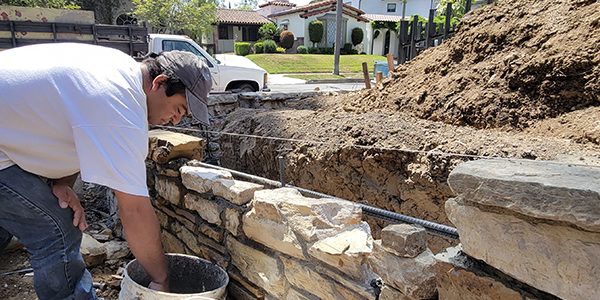Stone walls, with their timeless appeal and structural integrity, form a pivotal aspect of many landscapes and properties. However, like any architectural element, they require maintenance and occasional repairs to retain their beauty and function. This is where professional stone wall repair contractors come into play. These experts not only restore the walls to their former glory but also ensure their longevity against the elements. In this article, we delve into the critical aspects of choosing the right contractor, identifying repair needs, and the repair process itself.
Identifying Signs That Your Stone Wall Needs Repair
Visible Damage and Deterioration
Cracks, gaps, and loose stones in your wall are clear indicators that repair work is necessary. Such damage not only affects the wall’s appearance but can also compromise its structural integrity.
Water Damage and Drainage Issues
Proper drainage is crucial for the longevity of stone walls. Signs of erosion, moss, and algae growth point to water damage, necessitating immediate attention.
Structural Concerns
A leaning wall or issues with the foundation are severe signs that your stone wall requires professional assessment and repair to prevent potential collapse.
Choosing the Right Stone Wall Repair Contractor
Qualifications and Experience
The expertise of stone wall repair contractors is paramount. Ensure they have the necessary licenses, certifications, and a portfolio of past projects that showcase their capability to handle your specific repair needs.
Evaluating Reputation and References
A contractor’s reputation speaks volumes. Online reviews, testimonials, and before-and-after photos of previous projects can help gauge their reliability and quality of work.
Understanding Quotes and Contracts
A transparent and detailed quote, including a breakdown of costs, timelines, and warranty information, is essential for setting clear expectations and avoiding surprises.
The Repair Process: What to Expect
Initial Assessment and Proposal
The repair process begins with an on-site evaluation by the stone wall repair contractors. This assessment determines the extent of the damage and the best course of action, culminating in a detailed proposal.
Repair Techniques for Different Types of Stone Walls
Depending on the type of stone wall, various repair techniques, such as mortar repair, repointing, or stone replacement, may be recommended to address specific issues.
Finalizing the Project
After repairs are completed, quality checks ensure the work meets agreed-upon standards. Additionally, contractors should provide maintenance advice to help prevent future damage.
Common Stone Wall Repair Techniques
Repointing Mortar Joints
One of the most critical aspects of stone wall maintenance is the condition of the mortar joints. Over time, mortar may erode or crack, necessitating repointing. This process involves removing the old mortar and applying new mortar, which not only restores the wall’s appearance but also its structural integrity. Selecting the right mortar mix and color matching are crucial steps to ensure the repair blends seamlessly with the original wall.
Replacing Damaged Stones
In cases where stones have become too damaged to simply repair with mortar, replacement may be necessary. Sourcing stones that match the existing wall can be challenging but is essential for maintaining the aesthetic continuity of the wall. Professional stone wall repair contractors have the expertise to select and install replacement stones that complement the wall’s overall look.
Improving Drainage and Preventing Future Damage
Water is one of the most significant threats to the longevity of stone walls. Ensuring proper drainage can prevent water from accumulating and causing damage over time. In some cases, adjustments to the landscape or the installation of drainage systems may be recommended by your contractor to protect the wall from future water-related issues.
DIY vs. Professional Stone Wall Repair
Understanding the Limitations of DIY
While some minor repairs might be within the capabilities of a handy homeowner, understanding when to call in professional stone wall repair contractors is key. The expertise required to assess structural issues, select appropriate materials, and execute complex repairs often surpasses the skill set of the average DIY enthusiast.
The Value of Professional Expertise
Hiring professionals not only ensures that repairs are done correctly but also provides peace of mind. Contractors guarantee their work, offering warranties that DIY repairs cannot match. Their knowledge of the latest techniques and materials also means that your repaired wall will stand the test of time.
Cost Comparison: DIY vs. Professional Repair
While DIY might seem more cost-effective at first glance, inaccuracies or the use of improper materials can lead to further damage, ultimately costing more. Professional repairs, although initially more expensive, are an investment in the wall’s future, potentially saving money on future repairs.
Maintenance Tips for Stone Walls
Regular Inspection and Cleaning
Routine inspections can catch small issues before they become significant problems. Cleaning the wall of dirt, debris, and vegetation can prevent damage and maintain the wall’s appearance.
Vegetation Management
Plants and vines, while aesthetically pleasing, can cause damage to stone walls over time. Managing vegetation growth ensures that roots and vines do not compromise the wall’s integrity.
Seasonal Care and Prevention
Preparing your stone wall for winter can prevent damage from freezing and thawing cycles. Applying a breathable sealant can protect the stone and mortar from moisture penetration and subsequent freeze-thaw damage.
Innovations in Stone Wall Repair
Advanced Materials and Techniques
The field of stone wall repair is continually evolving, with new materials and techniques offering better results and longer-lasting repairs. For example, modern mortars and sealants designed for specific types of stone can provide enhanced protection against weathering and moisture.
Sustainability Considerations
Eco-friendly repair options are increasingly important for homeowners. Techniques that minimize waste and use sustainable materials are not only better for the environment but can also improve the longevity and performance of the wall.
Emerging Technologies
Technology, such as 3D scanning and drones, is beginning to play a role in stone wall repairs, allowing for more precise assessments and repairs in hard-to-reach areas. These technologies can improve the accuracy of repairs and reduce the overall time and cost involved.
Legal and Permit Considerations
Understanding Local Regulations
Before undertaking any repair work, it’s essential to understand the local regulations and permit requirements. This is particularly important for historic or landmark properties, where repairs may be subject to specific guidelines to preserve the wall’s historical integrity.
Contractor Compliance and Insurance
Ensuring that your chosen stone wall repair contractors are fully insured and compliant with local regulations can protect you from liability and ensure that the work is carried out to a high standard.
Selecting Stone Types for Repair and Restoration
Characteristics of Different Stone Types
The type of stone used in your wall affects its durability, appearance, and repair options. Understanding the characteristics of different stones can guide the selection process for replacements or new installations.
Sourcing and Selecting Stones
Local sources can often provide stones that match existing walls, but imported stones may be necessary for certain repairs. Environmental considerations should also guide the selection process, favoring sustainable sources where possible.
Cost Factors and Budgeting
The cost of stone varies widely based on type, source, and availability. Planning your budget with these factors in mind can help manage the overall cost of the repair project while ensuring high-quality results.
Frequently Asked Questions (FAQs)
1. How do I know if my stone wall needs repairs?
Signs that your stone wall may need repairs include visible cracks, loose or missing stones, deteriorating mortar, signs of water damage like moss or algae growth, and any sections of the wall leaning or bulging.
2. Can I repair my stone wall myself, or do I need a contractor?
Minor repairs like small cracks or replacing a few stones might be manageable as a DIY project. However, for extensive damage, structural issues, or walls that require specialized techniques, hiring a professional stone wall repair contractor is recommended.
3. How do I choose the right contractor for stone wall repairs?
Look for contractors with experience in stone wall repairs, valid licenses, and positive reviews or references. Ensure they provide a detailed quote and have a clear understanding of the scope of work.
4. What does the repair process involve?
The repair process typically involves an initial assessment, a discussion of repair options, and a proposal with cost estimates. The actual repair may include cleaning the wall, repointing mortar, replacing damaged stones, and implementing drainage solutions if necessary.
5. How much does it cost to repair a stone wall?
The cost varies significantly based on the wall’s condition, the extent of the damage, the type of stone, and local labor rates. Minor repairs might cost a few hundred dollars, while extensive restorations can run into thousands.
6. How long does stone wall repair take?
Repair timelines can range from a day or two for minor fixes to several weeks for major restorations, depending on the wall’s condition, size, and complexity of the repairs needed.
7. Will the repaired section match the rest of my wall?
Professional stone wall repair contractors strive to match the repair materials as closely as possible with the existing wall, including stone type and mortar color, to ensure a seamless repair.
8. Is there a warranty on stone wall repairs?
Many contractors offer warranties or guarantees on their work, typically covering labor and materials for a specified period. Ensure you understand the warranty terms before starting the project.
9. How can I prevent future damage to my stone wall?
Regular maintenance, including inspecting the wall, managing vegetation growth, ensuring proper drainage, and addressing minor issues before they escalate, can help prevent future damage.
10. Are there any legal or permit requirements for repairing a stone wall?
Depending on your location and the wall’s historical significance, you may need permits or must adhere to specific guidelines. Always check with your local building department or historic preservation office before beginning repair work.
Conclusion
Stone walls are a beautiful and durable addition to any property, but they require care and maintenance to preserve their integrity and appearance. Understanding the signs that repairs are needed, choosing the right stone wall repair contractors, and following through with regular maintenance can ensure that your stone wall remains a functional and aesthetic feature for years to come. Whether facing minor wear and tear or significant structural issues, professional expertise can restore your wall’s beauty and strength, protecting your investment in your property’s landscape.





